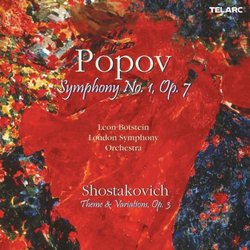| All Artists: Gavriil Nikolayevich Popov, Dmitry Shostakovich, Leon Botstein, London Symphony Orchestra Title: Popov Symphony 1 / Shostakovich Theme & Variations / Botstein, London Symphony Orchestra (Multichannel Hybrid SACD) Members Wishing: 0 Total Copies: 0 Label: Telarc Release Date: 11/23/2004 Album Type: Hybrid SACD - DSD Genre: Classical Styles: Historical Periods, Modern, 20th, & 21st Century, Symphonies Number of Discs: 1 SwapaCD Credits: 1 UPC: 089408064265 |
Search - Gavriil Nikolayevich Popov, Dmitry Shostakovich, Leon Botstein :: Popov Symphony 1 / Shostakovich Theme & Variations / Botstein, London Symphony Orchestra (Multichannel Hybrid SACD)
CD Details |
CD ReviewsA Shostakovich peer that never developed Larry VanDeSande | Mason, Michigan United States | 06/16/2006 (3 out of 5 stars) "Gavril Popov (1904-1972) was a Soviet composer and peer to Shostakovich whose Symphony No. 1 was undermined after the composer was, with Shostakovich and others, branded a formalist by Stalin's musical politburo, meaning they didn't like the music and forbade it. Unlike Shostakovich, who overcame this by clever musical articulation and genius, Popov's career went south and he never achieved the kind of world fame that followed Shostakovich all his days.
Shostakovich mentioned Popov in his memoirs, "Testimony", calling him a talented composer in a section where Shostakovich wrote about people gone before their time. As Leon Botstein writes in his serious notes to this recording, the two had many similarities -- they were born and died within a few years of each other, both married thrice, they were both considered part of the Soviet avant garde in the 1920s, both turned to symphonic music and wrote film scores, both visited England about the same time, and both were cast as formalists by the government. So enough about Popov, onto the music. I would call his Symphony No. 1 a combination of Stravinsky, Shostakovich, Messian, American film music and other 20th century influences. It is a large and sprawling canvass whose essential message is not as straightforward as the composer suggests. The long first movement of this richly orchestrated symphony first reminded me of the Shostakovich Symphony No. 4 but is more rambling and mystical. It goes of for 24:35 with often ear-splitting sound and what Botstein calls "manic momentum." Part of the time I thought I was listening to the film score to "The Thing From Another World"! The lengthy (16:32)central movement is a largo, again structurally comparable to Shostakovich but more rambling, that soon launches into what Botstein calls "a maelstrom of accelerating accumulation" before subsiding again. The finale is loud, jazzy and Stravinskian that is impressive for a while but mercifully lasts less than 10 minutes before ending in a blaze of Scriabin-like sound. Some critics had this on the "best of" lists last year and all were happy to see it. There had been other recordings of Popov including the Symphonies 1, 2 and 6. None of these are any longer in print here or in the U.K. I bought this CD when it first came out and didn't like it. I later experienced a Shostakovich boomlet, bought it again, and listened to it with different ears. It is an interesting piece of early Soviet music and clearly not agitprop. In his notes Botstein quotes the composer who intended the symphony to deal with the proletarian struggle. He said it is about struggle and failure, humanity and the "energy, joy and will of the victor's work." I'd say that appropriately describes the overall emotions of the piece without getting into its Stravinskain, Bergian, Schoenbergian and especially Scriabin-like affectations. If this sounds like a tasty stew, this 50-minute symphony may be for you. The SACD sound is sumptuous, three dimensional and with marvelous bass depth that shows off the London Symphony's brass and timpani sections. The Op.3 Theme and Variations is an early academic work by Shostakovich that is heavily influenced by Tchaikovsky and the composer's teacher, Glazunov. Botstein says this is probably the first recording of the 1922 composition. The theme begins in strings and variations later add more of the orchestra, but it never becomes too much of a good thing. If you heard this on the radio you'd be shocked to find out it is by Shostakovich. You might think it is one of Tchaikovsky's less popular suites. The notes by the conductor are very helpful and may be a bit too professionally musical for some of us listeners. With this release, Botstein confirms his reputation as a conductor unafraid to look at new material and record music that is on the edge of the classical music horizon. Telarc deserves some applause for going there with this recording. " |


 Track Listings (18) - Disc #1
Track Listings (18) - Disc #1